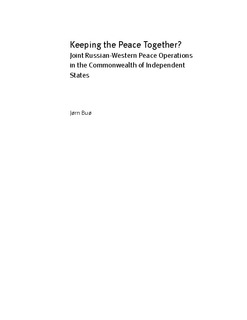Keeping the peace together? Joint Russian-Western peace operations in the Commonwealth of Independent States
Research report

View/
Date
2001Metadata
Show full item recordCollections
- NUPI Report [195]
- Publikasjoner fra Cristin - NUPI [1426]
Original version
NUPI-rapport nr. 259. NUPI, 2001Abstract
The purpose of this report is to discuss the conditions for future multinational peace operations in the Commonwealth of Independent States, including both Russian and Western forces. The aim and scope of this study are based on a positive attitude to challenges in general, in other words, a will to see opportunities and solutions instead of obstacles and insolvable problems. Problem: What are the possible options for multinational peace operations including
Russian and Western forces in the Commonwealth of Independent States? I will focus on investigating possibilities for CPOs in the CIS area. Content: The report will consist of an initial discussion focusing on various Russian approaches that influence thinking on combined peace operations. The focus on Russia is an inevitable consequence of my West/NATO origin, but in order to give a more balanced view of the problem it will also be necessary to look at some other factors influencing this potential co-operation. Further, I will discuss three generic options for combined peace operations in the Commonwealth of Independent States. The main goal of this study is a detailed discussion of various possible scenarios for future Russian-Western co-operation in the field of peace-keeping on the territory of the former Soviet Union. In order to place the topic in a proper context the author takes a closer look at various political, mental, historical and not least purely technical determinants limiting the potential scope of the joint peace-keeping. The study contains a detailed analysis of international (UN), Western (NATO, Canada) and Russian peace-keeping terminology. It also discusses the importance and relevance of various international frameworks determining the field, the scope and the geographical dimension of the potential Russian-Western co-operation, as well as the practical experience from the joint peace-keeping missions in the former Yugoslavia. The study gives a good insight in the history and practice of joint Russian-Western peacekeeping efforts. It also outlines and analyses various practical and political challenges linked with development of this relatively new and still challenging field of co-operation between Russia and the West. As such, it is relevant for both theoreticians of peace-keeping and for those who work with peace-keeping in the field.
Description
-
